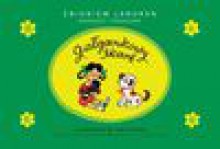LOVED BY GENERATIONS OF POLISH CHILDREN! FIRST NEW EDITION FOR 30 YEARS! KATARZYNA LENGREN (the author’s daughter) My father wrote Raggedy Treasure for me. I couldn’t read yet, so he decided a poem would be just right – I’d learn it by heart and he wouldn’t have to read to me all the time,...
show more
LOVED BY GENERATIONS OF POLISH CHILDREN! FIRST NEW EDITION FOR 30 YEARS! KATARZYNA LENGREN (the author’s daughter) My father wrote Raggedy Treasure for me. I couldn’t read yet, so he decided a poem would be just right – I’d learn it by heart and he wouldn’t have to read to me all the time, because I could recite it to myself while looking at the illustrations, where he depicted my mum, brother, granny, cat, dog and – on top of everything – me with the funny hairstyle, pinafore and socks I used t..o wear then. As usual, a work that initially stemmed from laziness (remember – he didn’t want to read to me!) brought splendid results. The book went through several large-circulation editions and there was a short film based on it. It was called The Negro Child, directed by Jadwiga Kędzierzawska, written and designed by Zbigniew Lengren, and in 1960 it won a prize at the Venice Film Festival (the Bronze Lion of St. Mark). Raggedy Treasure is very family-oriented. My mum used to tell a story about a doll that got lost in the garden and was found by the dog. Her stories were full of episodes connected with animals, children and an extended family ready to run to the rescue of anybody who needed help. The doll, the adored “black boy”, wasn’t black at all at first – it grew that way as the result of the intense love of five children. First it got its nose wiped off, then its cheeks kissed away, the lighter bits grew darker after baths and more or less accidental blueberry face masks. In spite of losing his lustre the “wee black boy” was sincerely loved, and his loss was a true tragedy. As for the dog, it was a pedigree fox terrier bitch with an old-fashioned name, Fifka, who had a particular gift for retrieving lost things. Those who doubted her good character claimed that first of all she carried various objects outside, only to bring them back later basking in the praise and glory – only after all hopes of finding the item had been abandoned, of course. Nobody really knows the truth of it, though, because dogs can be very discreet if they want to. This heart-warming story which took place in a garden that isn’t there anymore, written for little children who grow up so quickly, can still be enjoyed today – if not for any other reason, because of its very happy end. Zbigniew Lengren (1919–2003) One of the greatest Polish graphic artists and illustrators. Also a set designer, poster designer, columnist, and the author of poems for children and adults. His books have been published in German, English, Czech, French and other languages. He graduated from the Department of Art at Nicholas Copernicus University in Toruń. From 1946 he was associated with Marian Eile’s weekly Przekrój, where for over 50 years he regularly published the cartoon adventures of Professor Filutek and his dog Filuś. He collaborated with Teatr Buffo and Teatr Komedia. He also published in Szpilki and Playboy. He illustrated countless books, including the Doctor Doolittle series by Hugh Lofting. Amongst the numerous prizes he received for his work, the one he valued most was the Order of the Smile, awarded by Polish children.
show less

